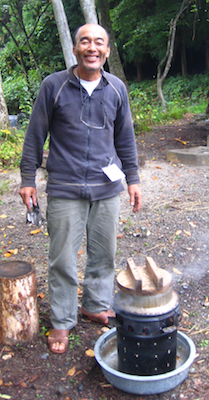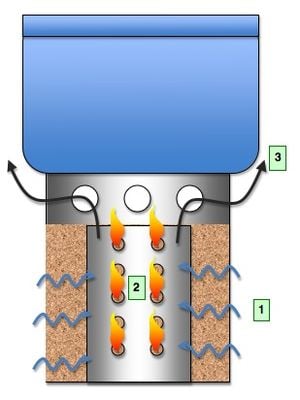
Introduction[edit | edit source]

This Rice cooker was invented and developed by Mr. Usui san of Nagano, Japan, after much experimenting.
The main advantages of this rice cooker are:
- It uses rice hulls as Fuel (a resource freely available where ever rice grows)
- It cooks rice very rapidly (halving the cooking time needed).
- The cooker can be made of freely available Waste materials.
This rice cooker can only be used out-doors. It is similar in action to the sawdust stove, but unlike the sawdust stove the rice-hulls do not require compaction and it is intended specifically for rice cooking, although probably it can be used to cook other things.
Where is it relevant?[edit | edit source]
This cooker is relevant for any place where rice is a grown and is a staple of the diet (most of Asia, as well as parts of Africa and South America). Using rice hulls not only turns a regular waste into a resource, it also reduces the dependency on wood as fuel, and thus the environmental stress that is caused by cutting trees for wood (as often happens in developing countries). Rice hulls also compares favorably to other fuel types in terms of its renewability and embodied energy.
How it works[edit | edit source]
The cooker consists of a smaller perforated inner can, which is nested inside a larger perforated outer can. The space between the two cans is then filled with rice hulls. Once the hulls are lit, air suction naturally occurs through the holes in the outer can, via the rice holes and feeds the fire in the inside can.

How to use it[edit | edit source]
-
Fig 3a: Place the Inner can in the centre of the Outer can.
-
Fig 3b: Fill the space between the cans with hulls. For ease of filling it is best to cover the inner can (for example with another can) whilst filling, so that the hulls don't fill the inner can.
-
Fig 3c: The rice hulls are then lit from the inside using any form of kindling (for example using dry thorns).
-
Fig 3d
-
Fig 3e: Once the rice hulls start burning and smoldering slowly, a pot containing the water and rice can be placed over it.
-
Fig 3e: The pot must be left unopened for at least 15-20 minutes and then left to simmer off the heat for 5 minutes more.
Building instructions
[edit | edit source]
bill of materials:
- 1 large can (around 15-20l)
- 1 smaller can (around 10l)
- 1 cooking pot with a lid (traditional "Hagama" - Japanese rice pot work best)




